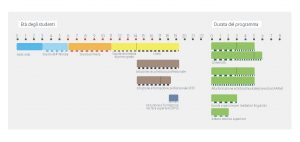The school system in Italy
The school system is the way in which schools are organized in Italy. Perhaps the school in Italy is very different from that of your country of origin, so it is important to understand how it works.
According to Italian law, all children, Italians, and foreigners, have the right to study and must comply with compulsory schooling, or obbligo scolastico, up to age 16 at least.
This means that parents must enroll and send their children to school from 6 to 16 years of age.
Schools in Italy can be public or private.
Public schools are managed by the state and, therefore, are similar in their organization throughout Italy. Public schools have low costs which are also calculated on the basis of the family’s economic situation.
Private schools are run by private individuals, like for example religious organizations and churches. These schools are still controlled by the Italian government but have more freedom to decide their organization, study programs, teaching method, calendar, etc.
Private schools have much higher costs than public schools.
On this page, you will also find more information on the costs of school in Italy and the support provided for families who need it.

Schools in Italy are organized according to the different school levels that accommodate children from their first years of age up to university. The education system is divided into:
- Daycare – Nidi/micronidi (3-36 months)
- Kindergarten – Asili (3-6 years)
First education cycle
- Primary school 6 – 11 years
- Middle school 11 – 14 years
Second cycle
After secondary school – any age
Before the age of 16, foreign students who have recently arrived in Italy are enrolled in school according to their age. However, the school can still decide to have the student take an entrance test to verify the language skills and level of education. It is also possible that teachers decide to enroll the student at a lower grade.
School calendar may vary according to level, region, and Comune (municipality).
Schools are generally open from September to June (or the end of July for daycare and kindergartens) for five or six days a week, from Monday to Friday or Saturday.
Opening and closing times may also vary, but most schools open from morning to afternoon.
Children do not go to school on Sundays and it is the day schools remain closed.
In Italy, children with disabilities do not attend separate classes, but the same as other students. Most teachers and schools are in fact prepared to welcome children or students with special needs and disabilities.
Classes with disabled students usually have fewer students than other classes. There are also insegnanti di sostegno, support teachers who help children who are most in need.
Parents are asked to bring their child’s health certificate before the child starts school. This way, the school and the parents can decide together the most appropriate educational plan for the child.
In Italy, the law decides the right to study especially between 6 and 16 years, including foreign minors without a residence document.
Foreign parents who are irregular also have the same obligation to enroll and send their children to school between the ages of 6 and 16. In these cases, the enrolment can be done with incomplete or no documentation, with the information given by the parents.
Parents who do not respect their children’s right to education, who do not enroll or do not commit to sending their children to school, respond legally; they can be reported, made to pay a fine, etc.
The school system in Italy is valid for all students, Italian and foreign.
In the case of foreign children, this right remains valid regardless of their legal situation whether regular or irregular. This also applies to minori stranieri non accompagnati (unaccompanied foreign minors), i.e. children under the age of 18 who are in Italy without parents, family, or legal guardians (tutori legali). These minors live in facilities or with foster families who host and care for them.
Unaccompanied foreign minors also have the same right to education and must be enabled to comply with compulsory schooling (obbligo scolastico) and go to school between ages 6 and 16 at least.
Enrolment can be done at any time of the year, even after the regular official registration period that students and their families must respect. The application must be submitted directly to the school and NOT through the online platform.
After enrolment, teachers handle academic inclusion through a personalized educational plan based on the abilities and needs of the student.
Useful link
-
Online enrolment
Ministry of education
Go to the link
You might be interested in
-
The cost of public school
See the article -
Communication between school and family
See the article